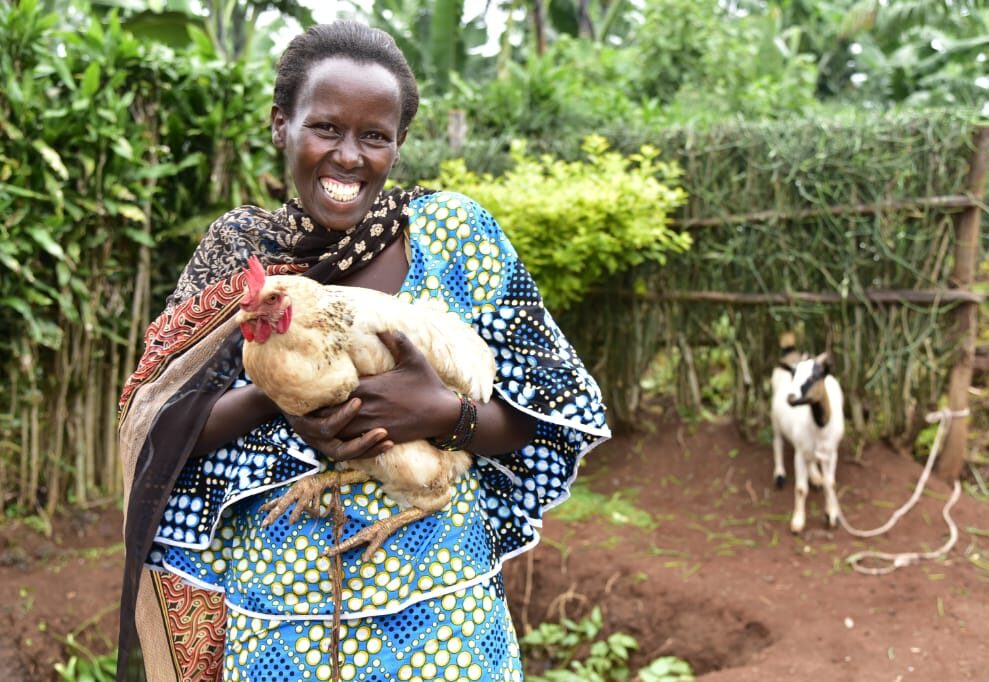Poultry Farming Through Care Group Model Transforms Rural Livelihoods
Through the care group model, farmers have transformed their livelihoods.
Nutrition continues to be a major public health concern in Rwanda, with 38% of children under five classified as stunted and 9% of children under five classified as underweight (Rwanda Demographic and Health Survey 2014-2015). One significant contributor to stunting is a lack of dietary diversity among Rwandan children due to a lack of animal-source protein consumption, which can provide a variety of micronutrients that are difficult to obtain in adequate quantities from plant-source foods alone.
Dietary diversity is also a significant challenge in the ten target districts where the Feed the Future Rwandan Hinga Weze activity operates, including Nyamagabe and Kayonza. To overcome this challenge, Hinga Weze adapted the Care Group model and mobilized households to join Care Groups as a conducive space for nutrition-sensitive agricultural education, peer learning, saving, and chicken rearing to increase income and the consumption of nutritious foods for women and children.
Since 2018, Hinga Weze has worked with communities to strengthen the capacity of Care Groups through trainings and coaching, mostly in good agricultural practices, nutrition, food safety, savings, gender, and poultry farming. In Kayonza and Nyamagabe districts, Hinga Weze also introduced the Small Livestock Program to improve the intake of animal-sourced foods by increasing the local availability of small livestock, mainly chickens. This, in turn, helped families generate household income to purchase nutritious foods while increasing access to meat and eggs for consumption.
So far, 46 care groups have received 9,200 chickens through Hinga Weze’s Small Livestock Program. After receiving and rearing their chickens, care group members were able to pay back $401 (400,000 RWF) through a pay-back model and to fund a second chicken production cycle. Care Groups have also been able to generate income from egg sales, distribute 15 eggs for consumption to each member per month, and use organic chicken manure in crop production and home gardens.
“Due to a lack of skills and knowledge related to nutrition-sensitive agriculture and nutrition, we were ignorant about what contributed to malnutrition in our area,” said Masengesho, the leader of Imbereheza Care Group in Kayonza district.
The Care Group trainings equipped communities with skills in chicken farming, feed formulation, and chicken rearing. For example, many Care Groups were supported to raise one-day-old chicks, while some have even become agents for Uzima Chicken, a local chicken supplier. Similarly, Wisigarinyuma Care Group was able to raise 1,000 one-day-old chicks until 35 days and sell 840 chicks to farmers outside of their group.
Hinga Weze’s Small Livestock Program also provided a full package for supply agents and farmers to care for their chickens, which included vaccines and specialized technical training on chicken maintenance, poultry house standards, feeds, transportation, marketing, business development, and general health standards for poultry businesses. This made the Small Livestock Program a de facto business provider for farmers and a nutritional conduit for households.
In addition to the chickens distributed as part of the Small Livestock Program, Hinga Weze distributed 86,400 chickens to 14,400 households (six chickens per household) across eight districts, which has greatly contributed to improving nutrition and dietary diversity. Through their weekly savings and joint household budgeting, farmers have increased their incomes and improved their livelihoods at the household level.
Hinga Weze is a five-year project funded by the USAID that aims to sustainably improve agricultural productivity, increase smallholder farmers’ incomes, and improve the nutritional status of women and children.





